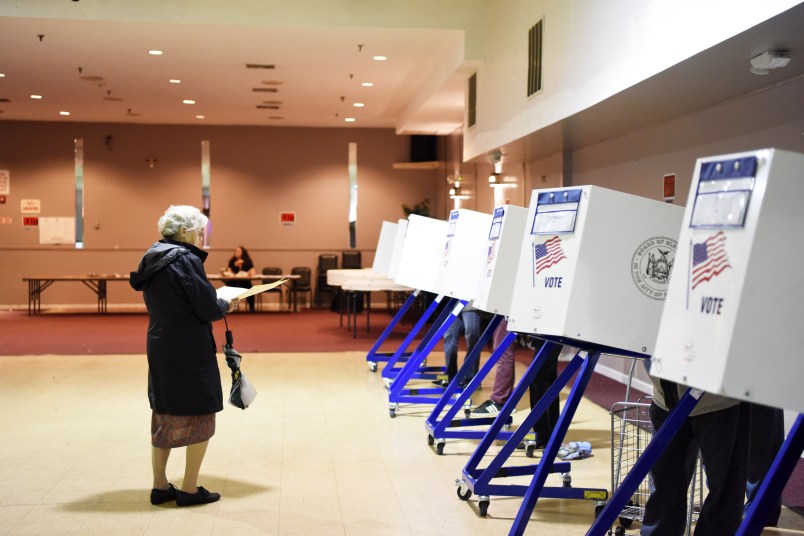A quickly debunked Russian report on how U.S. voter roll data was supposedly making it to the “dark web” presented a perfect case study in the disinformation challenges election officials are facing, amid a voting season already in turmoil due to the pandemic.
Overnight Monday, a Russian business daily called Kommersant published a report, later aggregated in English by the Moscow Times and others, claiming that “hackers” had accessed and released the voter registration data of millions of Americans
Election veterans would quickly recognize that the voter roll information described — such as name, date of birth, and gender — is already publicly available in most states and usually pretty simple to obtain. Election officials in two of the states cited in the reports, Connecticut and Michigan, quickly confirmed as much to TPM.
But that didn’t stop others from credulously amplifying the report on Twitter without this key context, spreading disinformation that could cause voters to doubt the security of the coming election.
“What it does is obviously undermine confidence in the electoral system and plays into a narrative that casts doubt on the legitimacy of the election,” Jeffrey Edmonds, former Russia director on the National Security Council, told TPM.
State election officials expressed similar concerns, saying that the mere suggestion of a hack is enough to sow doubt among voters.
“The alarm bell that this rings for us is that it has the potential to erode voters’ trust in the process if it is reported as a ‘hack,’” Gabe Rosenberg, a spokesperson for Connecticut Secretary of State Denise Merrill, told TPM. He noted that it costs just $300 to purchase the Connecticut voter roll information described in the report and that, because others have already purchased it and put it online, these bogus “hackers” probably wouldn’t have needed to even front that cost themselves.
In Michigan, meanwhile, voter roll information is available via an open records request, according to Tracy Wimmer, a spokesperson for Secretary of State Jocelyn Benson.
“We encourage all Michigan voters to be wary of attempts to ‘hack’ their minds, however, by questioning the sources of information and advertisements they encounter and seeking out trusted sources, including their local election clerk and our office,” she told TPM in an email, while encouraging voters to report suspected misinformation to misinformation@michigan.gov.
This is the second time in recent days that Benson’s office has had to stamp down false information about voting security. Last week, she announced an investigation into “racially-charged” robocalls that had gone out to Detroit residents and others claiming falsely that voting by mail would put them in a database that could be used for debt collection or “mandatory vaccines.”
There are several reasons why people working in the election space are able to obtain voter roll data in most states. Campaigns like to use registration information to help them get out the vote for their candidates. Voter advocates use the rolls to make sure the ballot is accessible to all eligible voters. Election prognosticators use them to help shape their predictions.
But that awareness doesn’t necessarily translate to a broader electorate that doesn’t pay too much attention to how these voting mechanisms work between elections. When such misleading reports arise, election officials must grapple with how to clarify the situation without further elevating the false allegations in a way that adds to the confusion.
Meanwhile, the American public faces an unrelenting onslaught of reports that are potentially targeted at spreading misleading narratives that cast doubt on the election.
Edmonds, now a research scientist at the national security think tank CNA, compared grappling with incoming sources of disinformation to “whack-a-mole” — “you can’t stop all the sources.”
“What you can try to do is inoculate the receivers so when they see something like that, they’re primed to receive it skeptically,” Edmonds added. “But it’s not clear to me that the patient wants to be inoculated.”
Later Tuesday, the FBI and the arm of the Department of Homeland Security that assists election officials with cybersecurity issues released their own statement knocking down the Russian report.
“Early, unverified claims should be viewed with a healthy dose of skepticism,” the statement said. “More importantly, we encourage voters to look to trusted sources of info, in this case state election officials who have correctly pointed out that a lot of voter registration data is publicly available or easily purchased.”







This is how they run a disinformation campaign.
Plant a few impossible stories, a lot of possible (but false) stories, and a few correct, but taken wildly out of context stories, stir, and you get a populace so confused that they will believe ANYTHING (QAnon for example.) The lack of critical thinking skills gets amplified by your Sock-puppets and Bots to the point that nobody knows who said what or where stories come from.
“When you believe in nothing, you’ll fall for anything.”
Why would the Russian’s want to reinforce Trump’s claims of a rigged election? Does anyone have any ideas?
Next they’ll tell me my epidermis is showing.
Dominance move.
Stating the obvious here - lots of Russian trolls are out in droves to help Putin’s Orange BFF cheat his way to re-election!
What is disturbing is that Ratcliffe’s refused to brief Congress in-person, just in written format where in its is easy to loose nuances.
Moreover, you now have Coverup Trumpian AG Barr doing this
Not a good way to catch those perps who welcomes, coordinates, colludes or conspires with foreign entities!
And more Russian trolls in FB:
https://news.yahoo.com/facebook-nabs-russia-linked-campaign-180713567.html